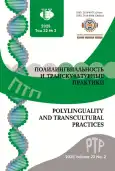Overcoming Tiki Pop: Polynesian Translingual Literature Against Cultural Exoticization
- Authors: Galaktionov S.S.1, Proshina Z.G.1
-
Affiliations:
- Lomonosov Moscow State University
- Issue: Vol 22, No 2 (2025)
- Pages: 303-313
- Section: LITERARY SPACE
- URL: https://journal-vniispk.ru/2618-897X/article/view/326849
- DOI: https://doi.org/10.22363/2618-897X-2025-22-2-303-313
- EDN: https://elibrary.ru/PVIVBL
- ID: 326849
Cite item
Full Text
Abstract
This study analyzes Tiki Pop as a cultural phenomenon of the 20th century and provides insight into how Polynesian translingual literature helps eliminate stereotypes imposed on indigenous cultures in the region. The author traces the history of Tiki Pop, from its inception in the 1930s to its decline at the turn of the century, and argues that this phenomenon was a byproduct of colonial times that affected the way Western audiences perceive Polynesia. This exoticizing view of the region is then contrasted to the way it is presented in Polynesian translingual literature. The author then delineates several linguistic devices that are utilized by indigenous ambilingual authors in order to outline their identity and combat stereotypical conceptualization of local cultures.
About the authors
Semyon S. Galaktionov
Lomonosov Moscow State University
Author for correspondence.
Email: semengal98@mail.ru
ORCID iD: 0000-0001-9025-5522
Postgraduate Student at the Department of Foreign Language Teaching Theory, Faculty of Foreign Languages and Area Studies
1 Leninskie Gory, Moscow, 119991, Russian FederationZoya G. Proshina
Lomonosov Moscow State University
Email: proshinazoya@yandex.ru
ORCID iD: 0000-0002-0570-2349
Doctor (Habil.) in Linguistics, Professor, Department of Foreign Language Teaching Theory, Faculty of Foreign Languages and Area Studies
1 Leninskie Gory, Moscow, 119991, Russian FederationReferences
- Holton, G.E.L. 2004. “Heyerdahl’s Kon Tiki Theory and the Denial of the Indigenous Past.” Anthropological Forum, vol. 14, no. 2, pp. 163-181. Print. https://doi.org/10.1080/0066467042000238976
- Kirsten, S.A. 2020. Tiki Pop. Cologne: Taschen. Print.
- Alexeyeff, K. 2016. “Re-purposing Paradise: Tourism, Image and Affect.” In Touring Pacific Cultures. Edited by K. Alexeyeff and J. Taylor. Acton, ACT: ANU Press, pp. 403-422. Print.
- Dudoit, D. Māhealani. 1999. “Against extinction: a legacy of native Hawaiian resistance literature.” Social process in Hawaiʻi, vol. 39, pp. 226-248. Print.
- Hiroa, T.R. 1938. Vikings of the Sunrise. Philadelphia: J.B. Lippincott Co. Print.
- Kirsch, P.V. 2018. “Voices on the wind, traces in the earth: integrating oral narrative and archaeo-logy in Polynesian history.” The Journal of the Polynesian Society, vol. 127, no. 3, pp. 275-306. Print. https://doi.org/10.15286/jps.127.3.275-306
- Proshina, Z.G. 2024. “Affinity of Saussurean Linguistics, World Englishes Paradigm, and Intercultural Communication Studies.” Polylinguality and Transcultural Practices, vol. 21, no. 4, pp. 621-631. Print. (In Russ.).
- Walworth, M. 2017. “Reo Rapa: A Polynesian contact language.” Journal of Language Contact, vol. 10, no. 1, pp. 98-141. Print.
- Walworth, M. 2021. “Eastern Polynesia.” In The Routledge Handbook of Language Contact. Edited by E. Adamou and Y. Matras. London and New York: Routledge, pp. 462-479. Print.
- Ovcherenko, U.V., and N.A. Tokareva. 2023. “Translingual Theory: Steven Kellman’s Studies.” Polylinguality and Transcultural Practices, vol. 20, no. 4, pp. 684-693. Print. (In Russ.). https://doi.org/10.22363/2618-897X-2023-20-4-684-693 EDN: LZCCFG FG
- Kachru, B.B. 2005. Asian Englishes Beyond the Canon. Hong Kong: Hong Kong University Press. Print. https://doi.org/10.1515/9789882200104
- Bakhtikireeva, U.M., Valikova O.A., and Tokareva, N.A. 2021. “At ‘Agora’ agenda today: approaches to the study of translingual literature.” Philological Sciences. Scientific Essays of Higher Education, vol. 6, no. 2, pp. 263-273. Print. (In Russ.). https://doi.org/10.20339/PhS.6-21.263 EDN: XTWQKD
- Tlostanova, M.V. 2011. “Transculturation as a model of sociocultural dynamics and the problem of multiple identification.” Issues in Social Theory, vol. 5, pp. 126-149. Print. (In Russ.).
- Proshina, Z.G. 2020. Study of contact varieties of English: Problems of Theory. World Englishes Paradigm. Moscow: Flinta. Print. (In Russ.).
- Kellman, S.G. 2019. “Literary Translingualism: What and Why?” Polylinguality and Transcultural Practices, vol. 16, no. 3, pp. 337-346. Print. (In Russ.). https://doi.org/10.22363/2618-897X-2019-16-3-337-346 EDN: MDAIVB
- Trask, H.-K. 1987. “Birth of the Modern Hawaiian Movement: Kalama Valley, O’ahu.” The Hawaiian Journal of History, vol. 21, pp. 126-153. Print.
- Trask, H.-K. 1991. “Natives and Anthropologists: The Colonial Struggle.” The Contemporary Pacific, vol. 3, no. 1, pp. 159-167. Print.
- Maurer, A. 2020. “Snaring the Nuclear Sun: Decolonial Ecologies in Titaua Peu’s Mutismes: E ‘Ore te Vāvā.” The Contemporary Pacific, vol. 32, no. 2, pp. 371-397. Print. https://doi.org/10.1353/cp.2020.0034 EDN: RWALCX
- Bakhtikireeva, U.M., and O.A. Valikova. 2022. “Language Keys: Foreign Cultural Lexicon in the Translingual (Russophonic) Literary Text.” RUDN Journal of Language Studies, Semiotics and Semantics, vol. 13, no. 1, pp. 184-200. Print. (In Russ.). https://doi.org/10.22363/2313-2299-2022-13-1-184-200 EDN: LGWHLV
- Hau’ofa, E. 1994. “Our Sea of Islands.” The Contemporary Pacific, vol. 6, no. 1, pp. 147-161. Print.
Supplementary files









